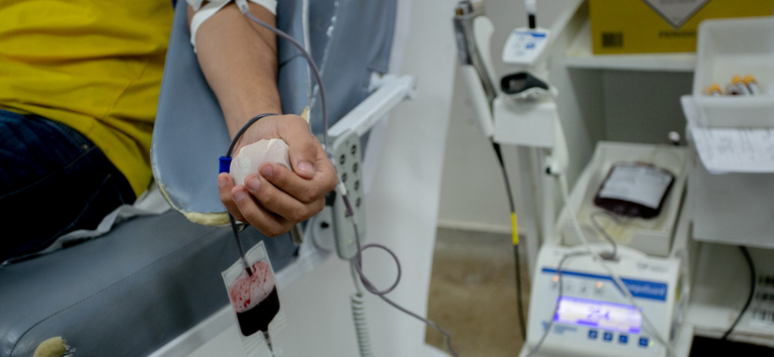Blood donation is an altruistic and solidarity act, which helps to save many lives; know the criteria for being a donor
Summary
World Blood Donor Day is celebrated on 14 June, a date dedicated to voluntary donations and awareness of the importance of this act. However, there are several doubts about the donation process in relation to the basic criteria, definitive impediments, medications and other factors involved in this process. Finally, after the donation there are some recommendations and behaviors that the donor must follow
This June 14th the world celebrates World Blood Donor Day, a date dedicated to all voluntary donors and which raises awareness of the importance of this gesture which saves thousands of lives every year.
However, many doubts still surround the blood donation process, such as: “Can obese people donate blood?”, “Can people with tattoos donate?”, “Do people with dengue fever have to wait?”. therefore, the Earth you explains the requirements and rules necessary for those who wish to practice this act of solidarity.
Fundamental criteria for donation
- Be between 16 and 69 years old (under 18s must present the formal consent of their legal guardian);
- People aged between 60 and 69 will only be able to donate blood if they have already done so before the age of 60;
- Present identification document with photo issued by an official body. Digital documents with photos are also accepted.
- Weigh at least 50 kg;
- Not pregnant or breastfeeding;
- I have slept at least 6 hours in the last 24 hours;
- Be nourished;
- Avoid fatty foods for 3 hours before donating blood;
- If the donation will take place after lunch, wait 2 hours.

Who can donate blood? Find out the requirements to be a donor
Main definitive impediments:
- Hepatitis after age 11.
- Clinical or laboratory evidence of the following blood-borne infectious diseases: hepatitis B and C, AIDS (HIV virus), HTLV I and II associated diseases, and Chagas disease.
- Illicit injectable drug use.
- Parkinson’s disease.
- Hepatitis B or C after or before the age of 10
- Drug-induced hepatitis: suitable after treatment and clinically evaluated.
- Viral hepatitis (A): After age 11, if you take a diagnostic test for the disease, you will be evaluated by your screening doctor.
Can obese people donate blood?
Obese people can donate blood as long as they meet certain health criteria related to chronic diseases such as diabetes and hypertension.
If the person with diabetes controls it only with food or oral hypoglycemic drugs and has no vascular alterations, he or she can donate, this happens in patients with type II diabetes mellitus. In cases of diabetes (type I and II) with the use of insulin the candidate will not be able to donate.
In the case of hypertensive patients, if the person has high blood pressure at the time of donation, they will not be able to donate. If it is under control, without the use of drugs, you can donate.
The use of any medications must be reported at the time of the interview, with name and dosage, so that an individual assessment can be carried out.
Can anyone with a tattoo donate blood?
According to the Ministry of Health, people who have had a tattoo or permanent makeup must wait a year to donate blood again.
In some blood collection services, given the possibility of evaluating the conditions for carrying out such procedures in the region/municipality, the period of ineligibility is 6 months.
Can people who have dengue donate blood?
A person who has had classic dengue must wait 30 days after recovery to donate blood. If the person has contracted dengue hemorrhagic fever, this period extends to 6 months.
For candidates who have had sexual intercourse with people diagnosed with arboviruses such as dengue, Zika and Chikungunya, you must wait 30 days after the last sexual intercourse. If the partner had dengue hemorrhagic fever, the period increases to 6 months.
Anyone who has been vaccinated against dengue must wait a period of four weeks after vaccination to donate blood, as the available vaccine is developed with live attenuated viruses.
If you have already donated and you suspect or confirm that you have contracted one of the arboviruses within 15 days of donating, you must inform the unit where the procedure was carried out.
Is it necessary to stop drinking alcohol to donate blood?
You must stop drinking alcoholic beverages 12 hours before donating. For smokers, a smoke-free interval of at least 2 hours before and after donation is recommended.
What drugs prevent blood donation?
The use of some drugs can represent an obstacle to donating blood. It is important to report what medications have been or are being administered during screening for the procedure.
Can people who have received the vaccine donate blood?
Some vaccines, such as the dengue vaccine, require a period of time before donating blood. Vaccination against Covid-19 prevents donation for 48 hours or 7 days, depending on the vaccine.
- Coronavac, from Sinovac/Butantan/Covaxin: 48 hours after each dose;
- Oxford/AstraZeneca/Fiocruz/Pfizer/BioNtec/Fosun Pharma/Janssen-Cilag/Sputinik/Moderna: 7 days after each dose;
- Flu vaccination prevents donation for 48 hours;
- Hepatitis B vaccination prevents donation for 48 hours;
- Yellow fever vaccination prevents donation for 4 weeks;
In case of flu or cold it is possible to return to donating blood seven days after the symptoms have disappeared.
Does who donate blood have a medical certificate?
Chapter IV of article 473 of the TUB provides that the worker can abstain from work, without prejudice to his salary, for one day, every 12 months, in the case of duly proven voluntary blood donation.
Can people living in the Northern region, where there is a risk of malaria, donate blood?
According to the Ministry of Health, there is no problem for people living in the Northern region to donate in another state in the same region, because the entire population is exposed to the same risk.
In the case of malaria, people who live in the Northern region or who have recently traveled there, compared to other states in the country, are at a greater risk of contracting this disease. Therefore, in the states of the extra-Amazon region a period of removal from the region at risk is required (temporary disability of 1 year).
How is blood donated?
Donating blood is completely safe. There is no risk of contamination when donating blood, as all materials used for blood donation are disposable and single-use. For each donation the maximum quantity of blood taken is 450 ml.
Men can donate blood every 2 months, for a total of up to four donations per year. Women can donate blood every 3 months, with a maximum of three donations per year.
After collection, the blood bag is separated into blood components (red blood cell concentrate, platelets and plasma). These components are authorized for use only after the results of mandatory laboratory tests. Units showing serological reactivity are discarded. Components obtained from a single blood donation can benefit up to four lives.
The entire procedure (registration, measurement of vital signs, anemia test, clinical screening, blood draw and snack) takes approximately 40 minutes. After donating blood, you will not be able to do some physically demanding activities.
Source: Terra
Ben Stock is a lifestyle journalist and author at Gossipify. He writes about topics such as health, wellness, travel, food and home decor. He provides practical advice and inspiration to improve well-being, keeps readers up to date with latest lifestyle news and trends, known for his engaging writing style, in-depth analysis and unique perspectives.









